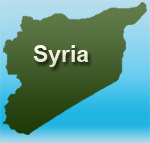
After Britain's House of Commons on Thursday voted to reject any military action against Syria, French President Francois Hollande had vowed that Paris would take part in any action on Syria.
On being asked whether Paris could intervene in the Arab country without the support of its British allies, Hollande said: "Yes."
"Each country is sovereign to participate or not in an operation. That is valid for Britain as it is for France," he said.
"There are few countries that have the capacity to inflict a sanction by the appropriate means. France is one of them," he added.
"We are ready. We will decide our position in close liaison with our allies,"
Earlier, a motion in British parliament demanding military action was defeated by 272 votes to 285.
Speaking after the vote, British Prime Minister David Cameron said it was clear that "the British parliament, reflecting the views of the British people, does not want to see British military action...I get that, and the government will act accordingly".
However, the vote was not binding. The opposition leader, Ed Miliband, has called on the prime minister to confirm he would not use the royal prerogative to order Britain to take part in military action before another vote in the parliament.
"I can give that assurance," Cameron said, insisting "I strongly believe in the need for a tough response to the use of chemical weapons."
Meanwhile United States officials have hinted that US may take unilateral action against Syria.
Caitlin Hayden, spokeswoman of White House National Security Council said, "Consultations with Britain will continue, but President Obama's decision-making will be guided by what is in the best interests of the United States".
"He (Obama) believes that there are core interests at stake for the United States and that countries who violate international norms regarding chemical weapons need to be held accountable," Hayden said.
Washington has been seeking coordinated military strikes on Syria with its allies in response to the alleged chemical weapons attack on Aug. 21 in the suburbs of Damascus, in which 1,300 people were reportedly killed.
In response to all these threats Syrian Prime Minister Wael al-Halqi had said that Syria would surprise the "aggressors" in case of a US-led military action.
"We will surprise the aggressors with victory as we did in 1973 October war," al-Halqi said.
The Syrian government and opposition groups have traded accusations about the use of chemical weapons. Syria has allowed an access for UN inspectors to probe the use of chemical weapons in eastern Ghouta.
(with inputs from IANS)
|
|


Comments: